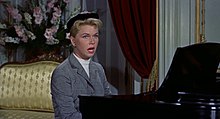کی سرا سرا
| «کی سرا سرا» | ||||
|---|---|---|---|---|
 دوریس دی در حال اجرای این ترانه در فیلم ۱۹۵۶ مردی که زیاد میدانست. | ||||
| تکآهنگ دوریس دی | ||||
| بی-ساید | «I've Gotta Sing Away These Blues» | |||
| تاریخ پخش | ۲۱ مه ۱۹۵۶ | |||
| تاریخ ضبط | ۱۹۵۶ | |||
| ژانر | موسیقی عامهپسند | |||
| زمان | ۲:۰۳ | |||
| ناشر | کلمبیا | |||
| آهنگساز(ها) | جی لیوینگستون | |||
| ترانهسرا(ها) | ری اونز | |||
| تهیهکننده(ها) | فرنک د وال | |||
| گاهنگاری تکآهنگهای دوریس دی | ||||
| ||||
«کِی سِرا، سِرا (هر اتفاقی بخواد بیفته میفته)» (انگلیسی: Que Sera, Sera (Whatever Will Be, Will Be))[الف] ترانهای نوشته شده توسط جی لیوینگستون و ری اونز است و نخستین بار در سال ۱۹۵۵ منتشر شد.[۴] دوریس دی این ترانه را در فیلم مردی که زیاد میدانست (۱۹۵۶) به کارگردانی آلفرد هیچکاک مطرح کرد[۵] و آن را در سکانسی از فیلم خواند.[۴]
سه ورس این ترانه در طول زندگی راوی — از کودکی، تا بزرگسالی و عاشق شدن، تا والدین شدن — پیش میرود و پس از هر کدام میپرسد «چه کسی خواهم شد؟» یا «چه چیزی پیش روی ماست؟» و کُرس این پاسخ را تکرار میکند: «هر اتفاقی بخواد بیفته میفته».
یادداشتها[ویرایش]
- ↑ "Que Sera, Sera (Whatever Will Be, Will Be)" is how the title is given in the song's official sheet music,[۱] but it has been rendered in various ways in other sources. The order of the main title and parenthetical may be swapped, as when the song was nominated for the Academy Award as "Whatever Will Be, Will Be (Que Sera, Sera)".[۲] It may also be referred to as simply "Que Sera, Sera", or "Whatever Will Be, Will Be". The title sequence of The Man Who Knew Too Much gives the title as "Whatever Will Be". Rarely, the title is rendered with diacritics as "Que Será, Será".[۳]
منابع[ویرایش]
- ↑ خطای یادکرد: خطای یادکرد:برچسب
<ref> غیرمجاز؛ متنی برای یادکردهای با نامFrontCoverوارد نشده است. (صفحهٔ راهنما را مطالعه کنید.). - ↑ "The 29th Academy Awards | 1957". Oscars.org | Academy of Motion Picture Arts and Sciences.
- ↑ Hartman 2013.
- ↑ ۴٫۰ ۴٫۱ Roberts (2006:135)
- ↑ Leigh (2001)
کتابشناسی[ویرایش]
- "Anecdotes: Ray Evans (1915–2007)", Art Daily (Online), n.d., archived from the original on 2007-07-13
- Einstein, Lewis (1902), The Italian Renaissance in England, New York: Burt Franklin
- Foster, J. J. (1884), "The Founder of the Russell Family", The Antiquary, 10: 69–71
- Griffen-Foley, Bridget (2010), Changing Stations: The Story of Australian Commercial Radio, Sydney: UNSW Press
- Gunston, Bill, ed. (2001), Aviation Year by Year, London: Dorling Kindersley
- Hartman, Lee (2013), "Que Sera Sera: The English Roots of a Pseudo-Spanish Proverb", Proverbium, 30: 51–104
- Hilder, George (9 April 1966), "Sydney", Billboard, p. 52
- "Hot 100", Billboard, p. 20, 14 September 1963
- "Jay-Gee Acquires", Billboard, p. 4, 11 December 1965
- Leigh, Spencer (19 October 2001), "Obituary: Jay Livingston", The Independent
- McFarlane, Ian (1999), Encyclopedia of Australian Rock & Pop, Sydney: Allen & Unwin
- McGrath, Noel (1978), Australian Encyclopedia of Rock, Coolah, NSW: Outback Press
- O'Donnell, John; Creswell, Toby; Mathieson, Craig (2010), The 100 Best Australian Albums, Richmond, Victoria (Australia): Hardie Grant
- Pomerance, Murray (2001), "The Future's Not Ours To See: Song, Singer, Labyrinth in Hitchcock's The Man Who Knew Too Much", in Wojcik, Pamela Robertson; Knight, Arthur (eds.), Soundtrack Available: Essays on Film and Popular Music, Durham, N.C.: Duke University Press, pp. 53–73
- Roberts, David (2006), British Hit Singles & Albums (19th ed.), London: Guinness World Records, ISBN 1-904994-10-5
- "Thorpe Gets Aussie Award", Billboard, p. 66, 13 August 1966
- Whitburn, Joel (1987), The Billboard Book of Top 40 Hits (3rd ed.), New York: Billboard Publications, ISBN 0-8230-7520-6
پیوند به بیرون[ویرایش]
- Day, Doris (1956), "Que Sera, Sera", The Man Who Knew Too Much, You tube.
- Rowe, Normie (1965), "Que Sera, Sera", YouTube.
